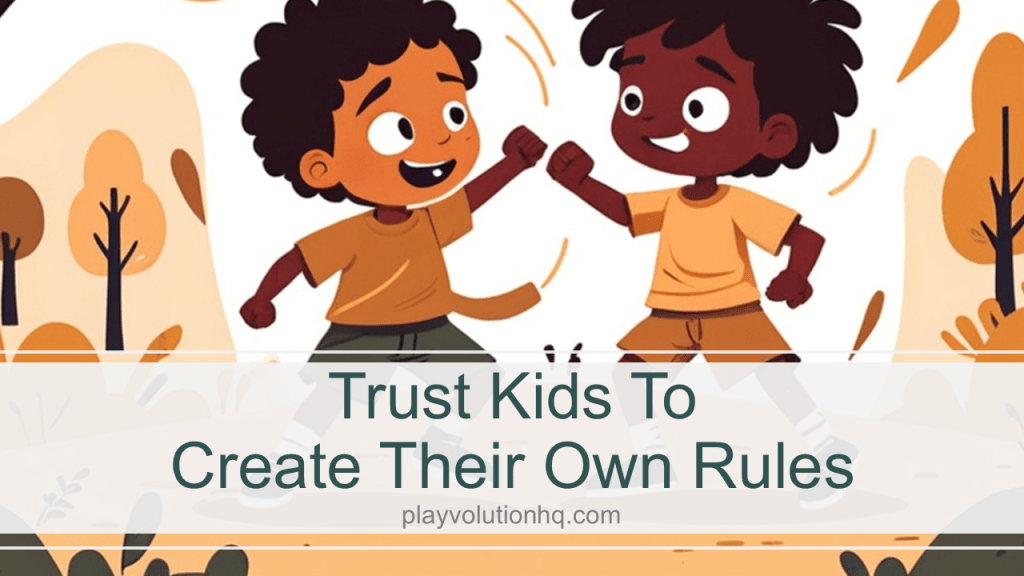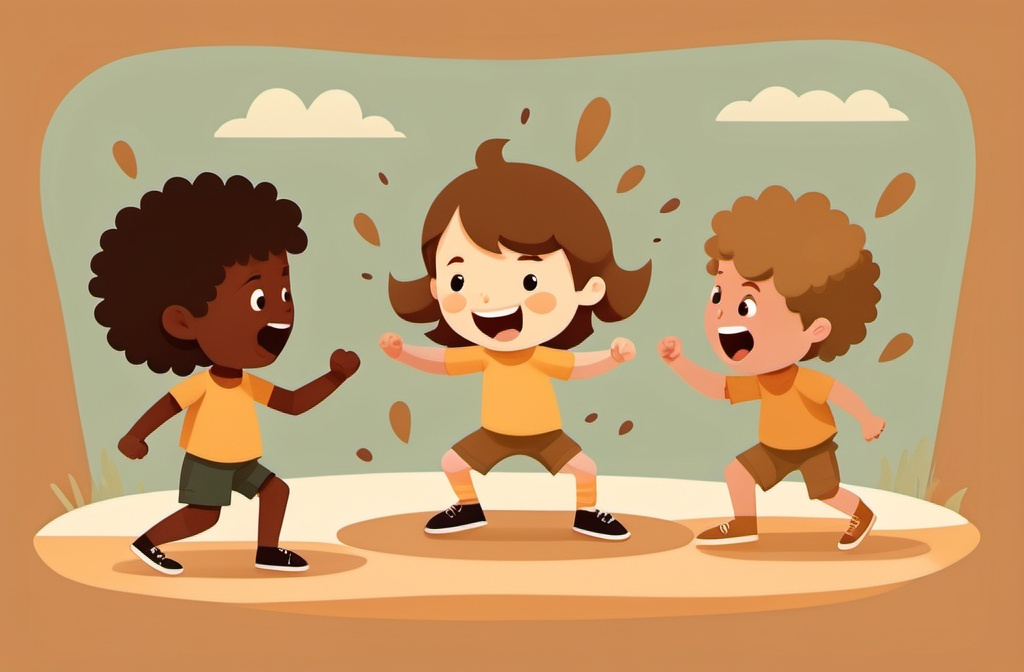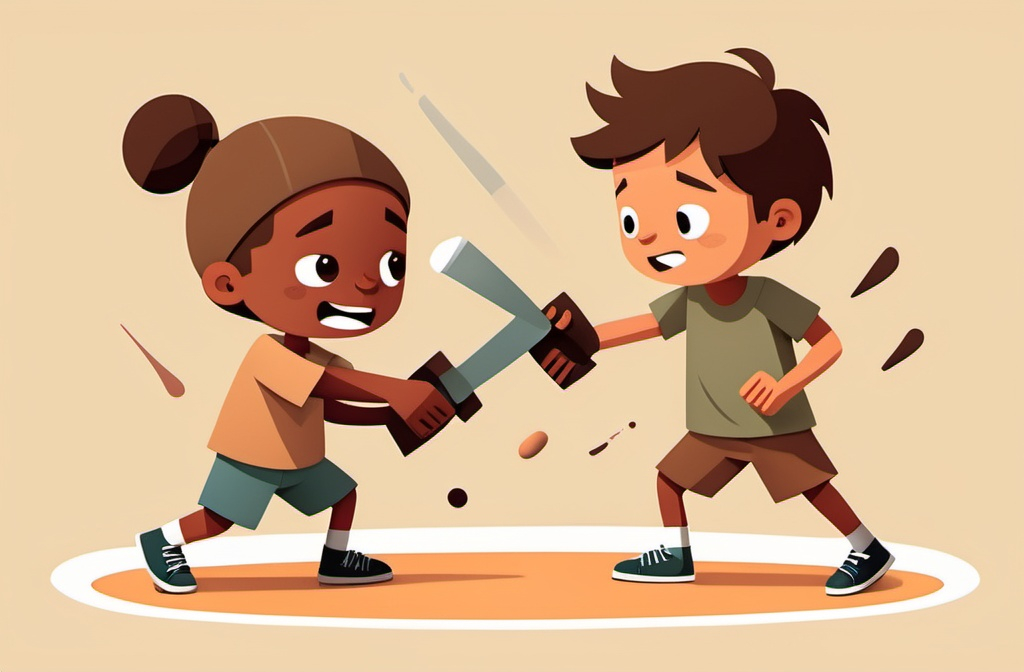
Table of Contents
Adults should trust kids to create their own rules, even for playfully aggressive activities like rough-and-tumble play. While kids should be the rule makers for all their play, this post will focus primarily on full-contact play, like wrestling, chasing, pushing, and playful punching. If you can bring yourself to allow them to make the rules for these types of play, trusting kids to create their own rules for activities like dramatic play and block play should be easy.
Play, rough-and-tumble and otherwise, is a path to children’s growth in all five developmental domains: physical, social and emotional, cognitive, communicative, and adaptive.
Adults tend to be keen to issue play rules to keep it safe and maybe make it look less chaotic. This default to external rule-making is understandable, especially when the play involves active physical contact. The problem is that such rules inadvertently steal learning opportunities play provides. The thing is, creating the rules is part of the play.
Peter Gray’s 4th Condition Of Play
Instead of stepping in to impose adult-created rules, trusting kids to create their own rules during play honors the fourth condition of play outlined by psychologist and play advocate Peter Gray:
Play Has Structure, Or Rules, Which Are Not Dictated By Physical Necessity But Emanate From The Minds Of The Players
Peter Grey
Gray emphasizes that the individuals playing must create and govern the internal rules of their play. This gives them ownership, allowing the play to remain voluntary, flexible, and driven by intrinsic motivation. When adults impose rules on play, it shifts the dynamic, removing a crucial opportunity for children to learn self-governance, collaboration, language and social skills, problem-solving skills, and more. We’ll look at the learning that happens when we trust kids to create their own rules in a bit. First, trust.
Why Kids should be trusted To Create Their Own Rules
Handing rule-making power over to three and four-year-olds may sound silly; they’re just kids. What do they know about rulemaking? Quite a lot, it turns out. Their knowledge and ability to handle this task stems from two fundamental human truths.
First, human wiring prioritizes self-preservation. We don’t like to get hurt and try to avoid it.
Second, our brains are wired for fairness and quickly spot inequities. We instinctively want everybody to have the same size piece of cake.
These two inborn human traits mean that kids will generally attempt to create rules that ensure everyone is physically safe and treated fairly. Since those tend to be the major concerns of adults when it comes to rough-and-tumble play rules, we’re off to a good start.
Will there be arguments and disagreements? Sure. Will some of their rules be hard to implement and stick to? Absolutely. Will all kids always default toward group safety and fairness? Absolutely not. Will some kids ignore rules they agreed to abide by? Of course, they will. But the same applies to any rules you create for their play.
And that’s where you come in.
Support Their Efforts
Trust kids to create their own rules, but don’t abandon them. Be there to help them learn from their mistakes and navigate the complicated (sometimes heated) social situations that can arise during rulemaking. Gently let them benefit from your knowledge and experience.
Challenges To Trusting Kids
Beyond underestimating children’s ability to negotiate, cooperate, and self-regulate during play, there are other reasons adults may find trusting kids to make their own rules challenging:
Fear of Chaos or Harm
Adults often worry that play might become unsafe or overly chaotic without rules. They may feel responsible for protecting children from potential harm, even in low- risk scenarios.
Desire for Predictability
Letting kids create their own rules introduces uncertainty. Adults may struggle with relinquishing control over the direction and outcome of play, which can feel uncomfortable.
Ego and Authority
Some adults may feel their role as a leader or authority figure is diminished when they step back and trust kids to create their own rules. This shift can challenge their sense of purpose or identity in caregiving or teaching.

Developmental Readiness Matters
Not all children are equipped to create rules for full-contact play like wrestling–or any other type of play. Developmental readiness significantly affects how successful it will be to trust kids to create their own rules:
- Toddlers and young preschoolers may lack the language and social skills to negotiate or articulate rules effectively. Some adult support is probably beneficial. But be cautious and avoid stepping in more than is necessary.
- Older kids without practice may also need support. Some older children lack experience playing with peers. Others lack experience with rulemaking. Their limited experience may necessitate additional adult oversight.
- As children’s experience, language skills, empathy, and problem-solving skills grow, they become more capable of creating and adapting rules collaboratively. Engaging in this process deepens their understanding of social norms and strengthens their ability to navigate complex group dynamics.
By observing children’s play, adults can offer the right level of support while stepping back as kids demonstrate increasing competence in self-regulation and rule-making.
Examples Of Kids’ Rules In Action
Here are some examples of rules that might be created for rough-and-tumble play when we trust kids to create their own rules:
- No hitting faces
- No pinching
- No scratching
- No hitting in the privates
- No pulling hair
- Big kids have to stay on their knees
- Time out if someone says STOP
- One hand only for tagging
It’s not a bad list of rules for keeping the play safe and fair, and it’s not much different than an adult caregiver would come up with. The big difference is the kids did the rulemaking. They owned the process. That matters.

Benefits Of Letting Kids Create Their Own Rules
When we trust kids to create their own rules, we support them in doing the following and more:
- Building Conflict Resolution Skills–When disagreements arise, children practice resolving them, often finding innovative solutions
- Understanding Limits–Children learn how to set limits for their play to keep it enjoyable for everyone
- Managing Big Emotions–Moments of frustration or excitement (during rule negotiation or play) provide practice in handling and expressing emotions in socially acceptable ways
- Reading Body Language–Kids become adept at noticing subtle cues, like Play Face, to gauge if everyone is still having fun or if rules need to be revisited to keep the play going
- Expanding Vocabulary–As kids negotiate rules, they naturally incorporate new words and concepts into their conversations
- Practicing Conversational Skills–Children develop communication skills when creating rules, learning to explain their ideas, clarify misunderstandings, and build consensus
- Negotiating–Collaborating on rules requires children to explain their ideas, listen to others, and find compromises
- Adapting Dynamically–As the play evolves rules may need to be reevaluated and updated to better meet the needs of the players
- Learning About Consent–Rule-making discussions help children understand the importance of consent and respecting others’ limits
Pre-fabricated adult rules wash away all these real-world learning opportunities that are part of the play process.

Trust Kids To Create Their Own Rules Wrap-Up
When we trust kids to create their own rules for play, we provide them with new learning opportunities and support them in developing autonomy and agency. This process fosters the development of social skills, emotional regulation, language development, and more in ways that simply imposing rules cannot.
Contribute content to Playvolution HQ
Brought to you by Explorations Early Learning
Browse Trainings

Post Author
Jeff Johnson is an early learning trainer, podcaster, and author who founded Explorations Early Learning, Playvolution HQ, and Play Haven.

Leave a Reply